初三代词((2)
初三英语总复习专题人称代词和物主代词

人称代词和物主代词[复习要点] 人称代词 人称代词的形式英语中有以下这些人称代词:英语中有以下这些人称代词:人 称称单 数复 数 主 格 宾 格 主 格 宾 格 第一人称I me we us 第二人称you you you you 第三人称he she it him her it they them 通 称 one ones[说明][说明]⑴ 人称代词有主格和宾格之分,人称代词有主格和宾格之分,主格在句中一般用作主语、主格在句中一般用作主语、主格在句中一般用作主语、表语等,表语等,宾格在句中用作动词的宾语和介词的宾语。
动词的宾语和介词的宾语。
⑵ 人称代词单数he, she 和it 的复数形式都是they ,宾格形式也相同,为them 。
⑶ 第三人称的人称代词分阳性he / him ,阴性she / her 和中性和中性it /it ,复数形式只有一,复数形式只有一个they / them ,不分性别。
,不分性别。
人称代词的指代人称代词主要用来指人,但是也可以用来指物。
但是也可以用来指物。
选用什么人称代词,选用什么人称代词,选用什么人称代词,主要取决于所指代主要取决于所指代的名词、短语或从句,并且在数和性上要与之保持一致。
例如:的名词、短语或从句,并且在数和性上要与之保持一致。
例如:Children can have delicious food and wear new clothes. They can also get some money from their parents. (They 指代前句中的复数名词Children 。
)。
)If you keep a pet, you need to spend some time taking care of it . (it 指代前半句中的pet 。
)it 有时也可以用来指人,例如:有时也可以用来指人,例如:What a beautiful baby – is i t it a boy? 多漂亮的孩子啊!是男孩吗?多漂亮的孩子啊!是男孩吗?Who’Who’s that? s that? — It ’s the postman. 谁啊?——是邮递员。
广州中考英语知识点

广州中考英语知识点广州中考英语知识点_中考知识要点英语是中考重点的考查科目之一,那么你知道广州中考英语都有哪些知识点吗接下来学习啦小编为你整理了广州中考英语知识点,一起来看看吧。
广州中考英语知识点:代词代词是代替名词、形容词和数词的词。
按其意义、特征及其在句中的作用分为:人称代词、物主代词、指示代词、反身代词、相互代词、疑问代词、不定代词和关系代词等。
一. 人称代词1.人称代词的人称、数和格,如下表所示。
2.人称代词有主格和宾格之分。
通常主格作主语,宾格作宾语。
如:I like tabletennis. (作主语)Do you know him(作宾语)3.人称代词还可作表语。
作表语时用宾格。
如:---Whos isknocking at the door---It’s me.4.人称代词在than之后与其他人或事物进行比较时,用主格和宾格都可以。
如:He is olderthan me.He is older than I am.二. 物主代词1.表示所有关系的代词叫物主代词。
物主代词分形容词性物主代词和名词性物主代词,如下表所示。
2. 形容词性物主代词的作用相当于形容词,可在句中作定语。
例如:Our teacheris coming to see us.Thisis her pencil-box.3. 名词性物主代词的作用相当于名词,在句中可用作主语、宾语和表语。
Our school ishere, and theirs is there.(作主语)--- Is thisEnglish-book yours (作表语)--- No. Mine is inmy bag.I ve alreadyfinished my homework. Have you finished yours (作宾语)三. 指示代词指示代词包括:this,that,these,those。
1. this和these一般用来指在时间或空间上较近的事物或人,that和those则指时间和空间上较远的事物或人,例如:This isa pen and that is a pencil.We are busy these days.In those daysthe workers had a hard time.2. 有时that和those指前面讲到过的事物,this 和these则是指下面将要讲到的事物,例如:I had a cold. That swhy I didn t come.What I want to sayis this ; pronunciation is very important in learning English.3. 有时为了避免重复提到的名词,常可用that或those代替,例如:Television sets made in Beijing are just as good as those madein Shanghai.4. this 在电话用语中代表自己,that 则代表对方。
初三英语名词和代词语法知识点归纳
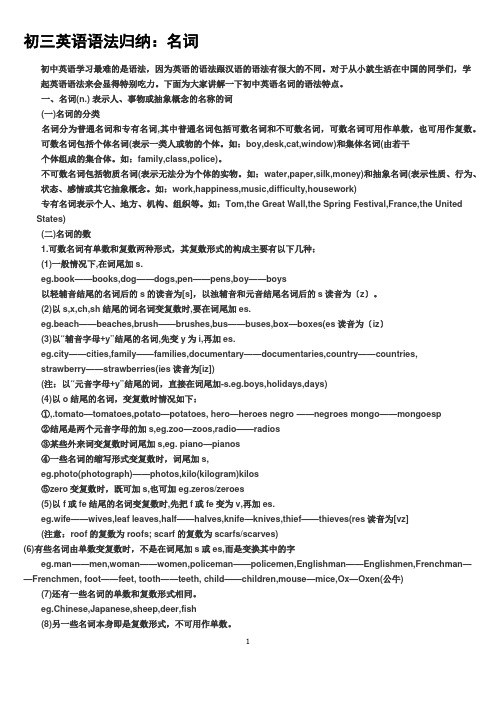
初三英语语法归纳:名词初中英语学习最难的是语法,因为英语的语法跟汉语的语法有很大的不同。
对于从小就生活在中国的同学们,学起英语语法来会显得特别吃力。
下面为大家讲解一下初中英语名词的语法特点。
一、名词(n.) 表示人、事物或抽象概念的名称的词(一)名词的分类名词分为普通名词和专有名词,其中普通名词包括可数名词和不可数名词,可数名词可用作单数,也可用作复数。
可数名词包括个体名词(表示一类人或物的个体。
如:boy,desk,cat,window)和集体名词(由若干个体组成的集合体。
如:family,class,police)。
不可数名词包括物质名词(表示无法分为个体的实物。
如:water,paper,silk,money)和抽象名词(表示性质、行为、状态、感情或其它抽象概念。
如:work,happiness,music,difficulty,housework)专有名词表示个人、地方、机构、组织等。
如:Tom,the Great Wall,the Spring Festival,France,the United States)(二)名词的数1.可数名词有单数和复数两种形式,其复数形式的构成主要有以下几种:(1)一般情况下,在词尾加s.eg.book——books,dog——dogs,pen——pens,boy——boys以轻辅音结尾的名词后的s的读音为[s],以浊辅音和元音结尾名词后的s读音为〔z〕。
(2)以s,x,ch,sh结尾的词名词变复数时,要在词尾加es.eg.beach——beaches,brush——brushes,bus——buses,box—boxes(es读音为〔iz〕(3)以“辅音字母+y”结尾的名词,先变y为i,再加es.eg.city——cities,family——families,documentary——documentaries,country——countries,strawberry——strawberries(ies读音为[iz])(注:以“元音字母+y”结尾的词,直接在词尾加-s.eg.boys,holidays,days)(4)以o结尾的名词,变复数时情况如下:①,.tomato—tomatoes,potato—potatoes, hero—heroes negro ——negroes mongo——mongoesp②结尾是两个元音字母的加s,eg.zoo—zoos,radio——radios③某些外来词变复数时词尾加s,eg. piano—pianos④一些名词的缩写形式变复数时,词尾加s,eg.photo(photograph)——photos,kilo(kilogram)kilos⑤zero变复数时,既可加s,也可加 eg.zeros/zeroes(5)以f或fe结尾的名词变复数时,先把f或fe变为v,再加es.eg.wife——wives,leaf leaves,half——halves,knife—knives,thief——thieves(res读音为[vz](注意:roof的复数为roofs; scarf的复数为scarfs/scarves)(6)有些名词由单数变复数时,不是在词尾加s或es,而是变换其中的字eg.man——men,woman——women,policeman——policemen,Englishman——Englishmen,Frenchman——Frenchmen, foot——feet, tooth——teeth, child——children,mouse—mice,Ox—Oxen(公牛)(7)还有一些名词的单数和复数形式相同。
初三英语中考复习 代词. 复习要点及练习 (无答案)
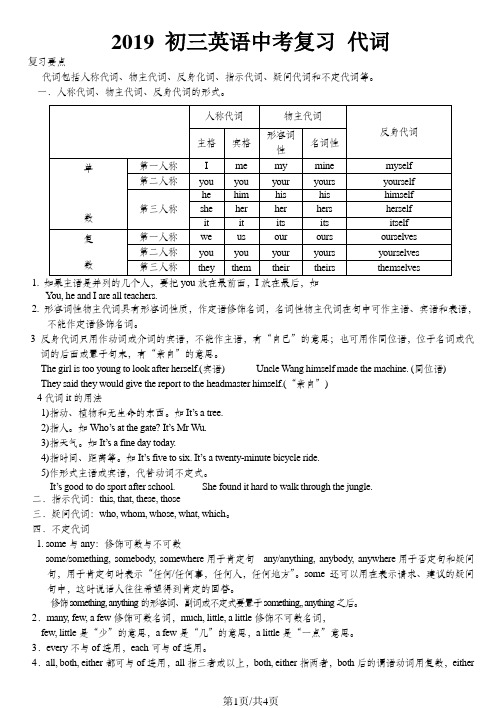
2019 初三英语中考复习代词复习要点代词包括人称代词、物主代词、反身化词、指示代词、疑问代词和不定代词等。
一.人称代词、物主代词、反身代词的形式。
1.Y ou, he and I are all teachers.2. 形容词性物主代词具有形容词性质,作定语修饰名词,名词性物主代词在句中可作主语、宾语和表语,不能作定语修饰名词。
3反身代词只用作动词或介词的宾语,不能作主语,有“自己”的意思;也可用作同位语,位于名词或代词的后面或置于句末,有“亲自”的意思。
The girl is too young to look after herself.(宾语) Uncle Wang himself made the machine. (同位语) They said they would give the report to the headmaster himself.(“亲自”)4代词it的用法1)指动、植物和无生命的东西。
如It’s a tree.2)指人。
如Who’s at the gate? It’s Mr Wu.3)指天气。
如It’s a fine day today.4)指时间、距离等。
如It’s five to six. It’s a twenty-minute bicycle ride.5)作形式主语或宾语,代替动词不定式。
It’s g ood to do sport after school. She found it hard to walk through the jungle.二.指示代词:this, that, these, those三.疑问代词:who, whom, whose, what, which。
四.不定代词1. some与any:修饰可数与不可数some/something, somebody, somewhere用于肯定句any/anything, anybody, anywhere用于否定句和疑问句,用于肯定句时表示“任何/任何事,任何人,任何地方”。
初三知识点总结代词的用法与替代

初三知识点总结代词的用法与替代代词是语言中的一类词汇,它们可以代替名词或名词短语的作用。
在英语中,代词在句子中扮演着非常重要的角色。
本文将对初三阶段英语学习的代词用法与替代进行全面总结。
一、人称代词人称代词用于代替特定的人或物。
以下是人称代词的用法:1. 主格人称代词:我 - I你 - You他/她/它 - He/She/It我们 - We你们 - You他们/她们/它们 - They主格人称代词可以在句子中作为主语或动词的执行者。
例句:- I am a student.(我是一个学生。
)- You need to study hard.(你需要努力学习。
)- He likes playing soccer.(他喜欢踢足球。
)- We are going to the park.(我们要去公园。
)- They are my friends.(他们是我的朋友。
)2. 宾格人称代词:我 - Me你 - You他/她/它 - Him/Her/It我们 - Us你们 - You他们/她们/它们 - Them宾格人称代词可以在句子中作为动词的直接或间接宾语。
例句:- She invited me to her birthday party.(她邀请我参加她的生日派对。
)- They gave him a gift.(他们给了他一件礼物。
)- Our teacher always encourages us.(我们的老师总是鼓励我们。
)- I saw them at the movie theater.(我在电影院看到了他们。
)3. 形容词性物主代词:我的 - My你的 - Your他/她/它的 - His/Her/Its我们的 - Our你们的 - Your他们/她们/它们的 - Their形容词性物主代词修饰名词,表示某人拥有某物或与某人有关联。
例句:- This is my book.(这是我的书。
)- Your dog is very cute.(你的狗很可爱。
初三(九年级)英语语法大全
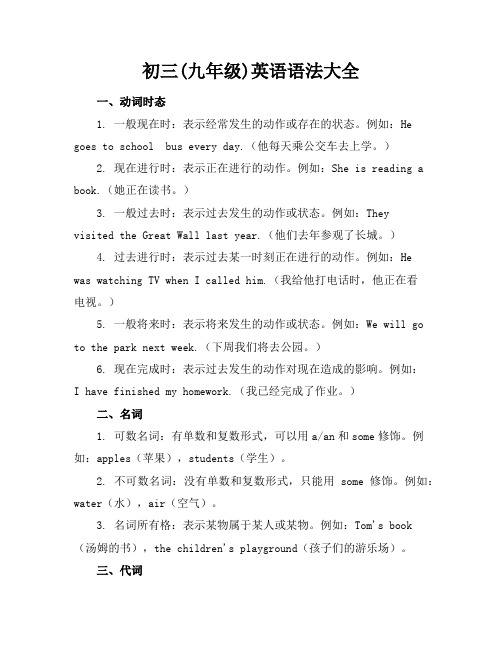
初三(九年级)英语语法大全一、动词时态1. 一般现在时:表示经常发生的动作或存在的状态。
例如:He goes to school bus every day.(他每天乘公交车去上学。
)2. 现在进行时:表示正在进行的动作。
例如:She is reading a book.(她正在读书。
)3. 一般过去时:表示过去发生的动作或状态。
例如:Theyvisited the Great Wall last year.(他们去年参观了长城。
)4. 过去进行时:表示过去某一时刻正在进行的动作。
例如:He was watching TV when I called him.(我给他打电话时,他正在看电视。
)5. 一般将来时:表示将来发生的动作或状态。
例如:We will go to the park next week.(下周我们将去公园。
)6. 现在完成时:表示过去发生的动作对现在造成的影响。
例如:I have finished my homework.(我已经完成了作业。
)二、名词1. 可数名词:有单数和复数形式,可以用a/an和some修饰。
例如:apples(苹果),students(学生)。
2. 不可数名词:没有单数和复数形式,只能用some修饰。
例如:water(水),air(空气)。
3. 名词所有格:表示某物属于某人或某物。
例如:Tom's book(汤姆的书),the children's playground(孩子们的游乐场)。
三、代词1. 人称代词:I(我),you(你/你们),he(他),she(她),it(它),we(我们),they(他们)。
2. 物主代词:my(我的),your(你的/你们的),his(他的),her(她的),its(它的),our(我们的),their(他们的)。
3. 指示代词:this(这个),that(那个),these(这些),those(那些)。
初三英语短文填空常考单词
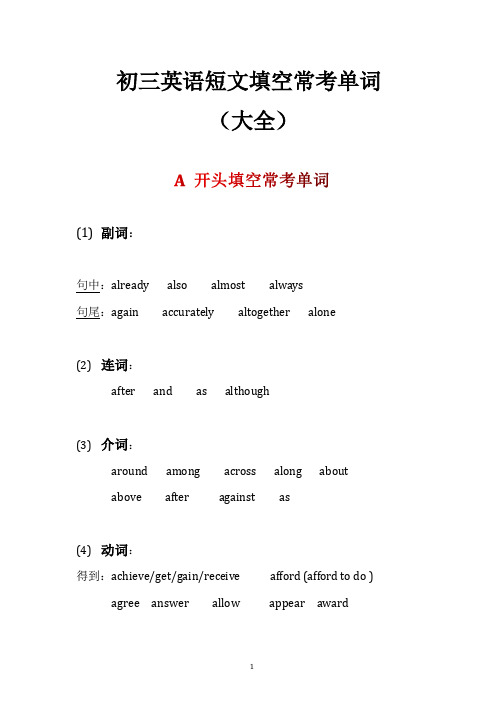
初三英语短文填空常考单词(大全)(1)副词:句中:already also almost always句尾:again accurately altogether alone(2)连词:after and as although(3)介词:around among across along aboutabove after against as(4)动词:得到:achieve/get/gain/receive afford (afford to do ) agree answer allow appear award(5)代词:a. anything anybody all another anyb. bothc. everybody/everything/either/eachs. somebody/somethingn. nothing/nobody/neither/noneo. others other one(s)(1)连词:but because before(2)介词:besides beside/next to belowbehind before between(3)动词:begin/start become believeblow book break borrow(4)形容词:beautiful/pretty brave briefbetter/best busy聪明:bright/clever/smart/wise(1)动词:change sth to sth choose to do sthconfuse called catch/know/understandcause sb./sth. to do check v./n.close continue correct v. 纠正complete/finish complain connect…to/withcompare…with…cost control(2)形容词:careful(carefully) careless correctcommon crazy cheap convenientconfident clear comfortable cold clever一定的:certain/sure be ……to do 一定去做某事正确:right true correct real(3)名词:chance choice cornerculture/custom hobby/habit(1)动词:decide dislike/hate develop discover drive(驱赶)discuss disappear毁坏,破坏damage/destroy/hurt/wound(2)形容词:different(difference)difficult dull/boringdishonest deaf dangerous developing--developed(3)名词:make a decision/suggestion dream/ambitionduty diet day danger darkness(4)介词:during(1)副词:even/ever exactly easilyeverywhere enough especially(2)形容词:early/earlier easy elder emptyexcited expensiveelse(what/who…else anything/nothing else)好的:excellent/perfect/nice/fine/good/great/wonderful(3)动词:解释,回答:explain/answer/say/suggest检查:examine/checkenjoy encourage sb. to do end n./v. escape希望:expect/wish/hope(4)介词:except(5)名词:end everything/body测试:exam/quiz/competition/contestexercise(s) experience(s) example(1)名词:fun friendship form freedom flight种类:form type kind(2)动词:forget follow find finish/complete fail发现:find/discover/notice/learn/realize(3)副词:far(farther, farthest) fastfinally first forward(4)介词:from(5)形容词:first friendly favorite few funnyfine/well/nice following frightened/afraid(1)形容词:好的:good/great开心的glad/pleased/happy/satisfied温柔的gentle 大方的generous(2)动词:grow guess go give得到get gain achieve receive(3)名词:goal game group guide(4)副词:gently generally greatly(1)名词:habit hobby headache healthheart help hope hour愿望hope wish dream目标ambition goal aim task(2)动词:hope happen hate helphesitate hide hurry希望hope wish expect(3)形容词:大huge /giant / big largehomeless helpful hungryhealthy harmful happy(4)副词:happily hard hardly(5)连词:However how(1)名词:idea information importance(2)副词:instead indeed/truly inside into immediately(3)动词:introduce include improve(4)形容词:impossible importantimpatient interesting/amusing(5)连词:if(1)动词:join judge jump(2)名词:journey judge裁判joy---happiness(3)副词:just(1)名词:key kind of knowledge(2)动词:keep know knock(1)动词:learn leave let lift(raise)live(2)形容词:little/ less/ leastlocal late lazy lucky large(big/ great)★lonely(与alone 区别)lovely likely (be likely to do )= possible 补充:可能perhaps、possibly 、probably、maybe(3)副词:later luckily(4)介词:like (such as 与for example )(1)动词:miss 想念,错过mean 意味着(show)meet 遇见,满足move 搬家match 与……相配mind 介意matter 要紧makemake 相似单词:make、have、let +sb. do sth.cause / enable sb. to do sth.(2)名词:market membermethod 方法(way/ solution)month manner(礼仪)message 信息(information)(3)形容词:many/ much/ more/ most modern(1)动词:notice 注意到need(2)形容词:nervous 紧张的new necessary必要的(unnecessary)nice(3)名词:nation news=messageneighbor(neighborhood)notice(4)代词:nothing nobody neither(either)none(all)(5)副词:nearly never nearby扩展:紧张的nervous/worried好nice pleasant good(better、best)great(greatly)well(形容词:身体好)excellent perfect wonderful国家nation country state几乎almost nearly发现find notice discover(1)动词:own offer order ask(2)形容词:ordinary only own other outdoor(3)副词:often once of over outside(4)介词:over= throughout out outside(5)连词:or(1)动词:promise pay play planprevent prefer prepareprovide提供process 加工produce生产prove 证明(2)名词:pain performance placeprogress进步process过程practice(3)形容词:mphysical 身体的patient (impatient)pretty powerful private (personal)public 公共的pleased pleasant polite (4)副词:possibly perhaps probablypolitely personally扩展:给give……to sb. offer……to sb.provide sb. with sth. provide sth. for sb.地方place location address常考的代词(有时可做形容词用)other all neither either both any each every another one(ones)(1)名词:question(2)形容词:quiet quickquickly quietly quite(1)动词:receive realize reach remember requireReduce refuse run relax(2)形容词:real rich responsible right(3)副词:really recently right rather(4)名词:reason result restsuppose show seem suggestshare spend spread start(2)名词:secret story shame = pitysign symbol situation somebody(3)形容词:serious simple special softsuccessful strict surprising strangesame similar(4)副词:suddenly slowly still seriouslysometimes soon seldom(1)副词:tomorrow tonight today too thenthere together terribly(2)介词:till to towards through throughout(3)动词:turn try train touch teach trouble(4)名词:trouble team teenager tradition(5)形容词:tired thirsty thankful thick thin terribletheir traditional(1)形容词:unusual useful unhappy upset unhealthy (2)介词:until up under(3)连词:until unless(1)形容词:various(2)动词:vary visit(1)动词:waste warn work(运转;起作用)wonder(想知道)worry(2)形容词:wonderful worse wise wrong worried(3)介词:with without within(4)连词:what whether while(1)副词:yet yesterday(2)形容词:young(3)名词:youth year21。
专题02 代词-2019年中考英语母题题源系列(原卷版)
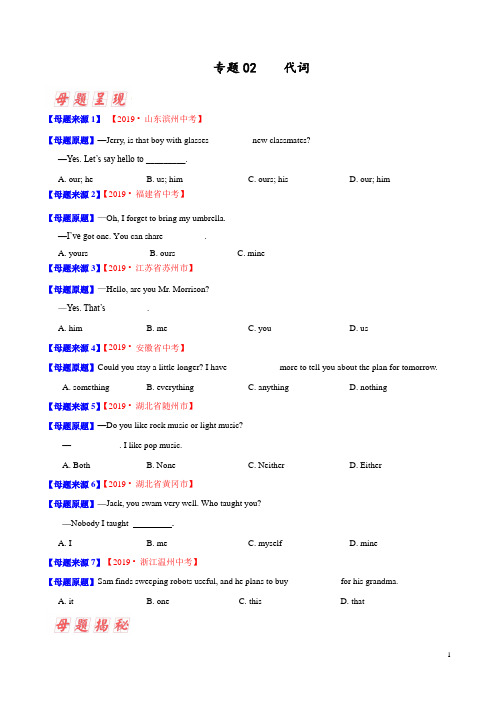
专题02 代词【母题来源1】【2019 •山东滨州中考】【母题原题】—Jerry, is that boy with glasses _________ new classmates?—Yes. Let’s say hello to _________.A. our; heB. us; himC. ours; hisD. our; him【母题来源2】【2019 •福建省中考】【母题原题】—Oh, I forget to bring my umbrella.—I’ve g ot one. You can share _________.A. yoursB. oursC. mine【母题来源3】【2019 •江苏省苏州市】【母题原题】—Hello, are you Mr. Morrison?—Yes. That’s _________.A. himB. meC. youD. us【母题来源4】【2019 •安徽省中考】【母题原题】Could you stay a little longer? I have ___________ more to tell you about the plan for tomorrow.A. somethingB. everythingC. anythingD. nothing【母题来源5】【2019 •湖北省随州市】【母题原题】—Do you like rock music or light music?—___________. I like pop music.A. BothB. NoneC. NeitherD. Either【母题来源6】【2019 •湖北省黄冈市】【母题原题】—Jack, you swam very well. Who taught you?—Nobody I taught .A. IB. meC. myselfD. mine【母题来源7】【2019 •浙江温州中考】【母题原题】Sam finds sweeping robots useful, and he plans to buy ___________ for his grandma.A. itB. oneC. thisD. that【试题分析】这些试题考查了代词的各种常见用法:人称代词、不定代词、反身代词、指示代词等。
- 1、下载文档前请自行甄别文档内容的完整性,平台不提供额外的编辑、内容补充、找答案等附加服务。
- 2、"仅部分预览"的文档,不可在线预览部分如存在完整性等问题,可反馈申请退款(可完整预览的文档不适用该条件!)。
- 3、如文档侵犯您的权益,请联系客服反馈,我们会尽快为您处理(人工客服工作时间:9:00-18:30)。
13. This is _______(我的) book. That is__________(他的) 14. 15. 16. 17. 18. _______(他的) chair is blue. _____________( 我们的) is yellow. _______(我们的) classroom is big.__________( 你们的) is small. _______(他) often plays basketball after school. _______(他的) teacher is good. _____(她的)is good too. _______(我们) buy a pair of shoes for _______(他).
教学 内容
物主代词表示所有关系的代词,也可叫做代词所有格。物主代词分形容性物主代词和名词性物主代词 二种,其人物和数的变化见下表。 物主代词 数 人称 类别 形容词性物主 代词 名词性物主代 词 汉语 单数 第一 人称 my mine 我的 第二 人称 your yours 你的 his his 他的 第三 人称 her hers 她的 its its 它的 第一 人称 our ours 我们 的 复数 第二 人称 your yours 你们 的 第三 人称 their theirs 他(她、 它)们的
个 授课时间:2008-4-13 年级:初三 课题:代词 课时:1 小时
性
化
辅
导
教
案
备课时间:2008-4-14 学员姓名: 教研老师:
教学 正确运用代词 目标 难点 代词的灵活运用 重点 I. 代词
代词是代替名词的一种词类。大多数代词具有名词和形容词的功能。英语中的代词,按其意义、特征 及在句中的作用分为:人称代词、物主代词、指示代词、反身代词、相互代词、疑问代词、关系代词 和不定代词八种。 (1) 人称代词和物主代词 人称代词是表示"我"、"你"、"他"、"她"、"它"、"我们"、"你们"、"他们"的词。人称代词有人称、数 和格的变化,见下表: 人称代词 人称 第一人称 第二人称 第三人称 单数 主格 I you he she it 宾格 me you him her it they them 主格 we you 复数 宾格 us you
巩固练习: 1. ________(我) am a teacher.
1
2. 3. 4. 5. 6. 7. 8. 9. 10. 11. 12.
My father is talking with _______(我). This is _______(我的) book. _______(他的) chair is blue. _______(我们的) classroom is big. _______(他) often plays basketball after school. _______(他的) teacher is good. _______(我们) buy a pair of shoes for _______(他). Please pass_____(我们) the ball. _______(他们) are listening to the radio. ________(我) am a teacher. My father is talking with _______(我).
19. Please pass_____(我们) the ball. 20. _______(他们) are listening to the radio. 21. My book is blue. _________(you) is red. 22. Our chair is better than _________ ( they). 23. I will give the presents to________(they).
反身代词的用法: 1、 反身代词不能作主语,但是它可以作主语同位语,放在主语后或句末。: 如:我亲自去了电影院。 误:Myself went to the cinema. 正:I went to the cinema myself. 2、 反身代词可以作宾语的同位语。 如:I wish I could hear Beethoven himself play this music.我希望我能听贝多芬他亲自弹这首曲子。 You can go and ask him himself.你可以去问他本人。 3、 反身代词可以作介词的宾语。 如:Nobody, she learnt it all by herself.没人,她自学的。 I mended the bike by myself. 我独自修的自行车。 She said to herself: ”what's wrong with my eyes?”她自言自语地说,“我的眼睛怎么啦?
2
24. These books are________(I), and those are____(ou).
25. My ruler is long. ________ ( you ) is short. 26. My bike is broken. May I borrow______ ( she)? 27. Can you show _______(I) your book? 28. It’s time for ______(they) to go home. 29. Mr. Green often tells _______(we) some stories. 30. These are not your desks. They are _____(our). 31. This is not my shirt. It’s _______(he) 32. I saw ________(she) in the shop yesterday. (2)反身代词的构成: .第一、 第二人称的反身代词由形容词的物主代词加上 self, selves 构成。 如: myself 我自己 , ourselves 我们自己 ,yourself 你自己, yourselves 你们自己.第三人称的反身代词是由宾格加上 self, selves 构成。 如:himself 他自己, herself 她自己, itself 它自己 ,以及 themselves 他们/她们/它们自己。值得注意的 是,凡是单数人称代词的反身代词在后加 self,而复数人称的反身代词在后加 selves。 第一人称 I myself 第二人称 you yourself 第三人称 she he It we ourselves you yourselves they herself himself itself themselves
